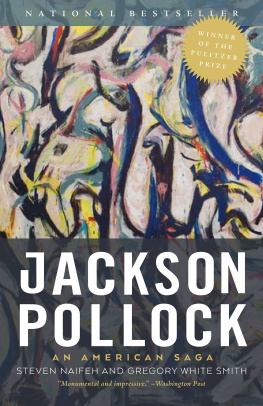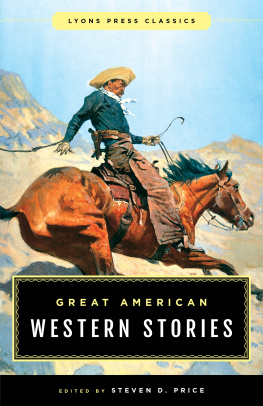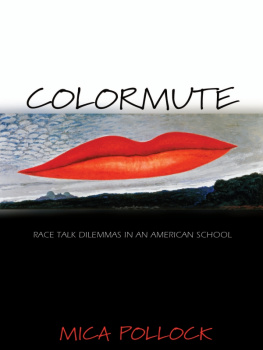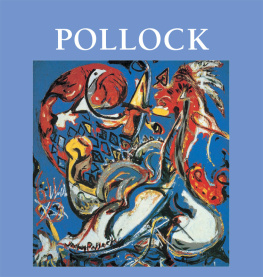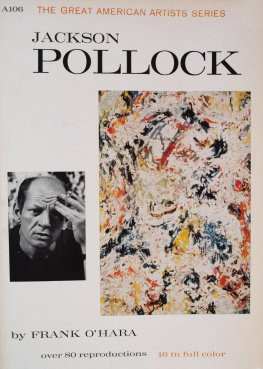Steven Naifeh - Jackson Pollock: An American Saga
Here you can read online Steven Naifeh - Jackson Pollock: An American Saga full text of the book (entire story) in english for free. Download pdf and epub, get meaning, cover and reviews about this ebook. year: 2013, publisher: Argo-Navis, genre: Non-fiction. Description of the work, (preface) as well as reviews are available. Best literature library LitArk.com created for fans of good reading and offers a wide selection of genres:
Romance novel
Science fiction
Adventure
Detective
Science
History
Home and family
Prose
Art
Politics
Computer
Non-fiction
Religion
Business
Children
Humor
Choose a favorite category and find really read worthwhile books. Enjoy immersion in the world of imagination, feel the emotions of the characters or learn something new for yourself, make an fascinating discovery.
- Book:Jackson Pollock: An American Saga
- Author:
- Publisher:Argo-Navis
- Genre:
- Year:2013
- Rating:4 / 5
- Favourites:Add to favourites
- Your mark:
- 80
- 1
- 2
- 3
- 4
- 5
Jackson Pollock: An American Saga: summary, description and annotation
We offer to read an annotation, description, summary or preface (depends on what the author of the book "Jackson Pollock: An American Saga" wrote himself). If you haven't found the necessary information about the book — write in the comments, we will try to find it.
Jackson Pollock: An American Saga — read online for free the complete book (whole text) full work
Below is the text of the book, divided by pages. System saving the place of the last page read, allows you to conveniently read the book "Jackson Pollock: An American Saga" online for free, without having to search again every time where you left off. Put a bookmark, and you can go to the page where you finished reading at any time.
Font size:
Interval:
Bookmark:

"Monumental and impressive."
Washington Post
"For once, with this intense, engrossing, and indeed brilliant work, we have a biography that justifies its length. Seldom have the history of an artist, the development of his imagination, the fevers of his soul been more grandly yet intimately described."
Interview
"Brilliant and definitive ... so absorbing in its narrative drive and so exhaustively detailed that it makes everything that came before seem like trial balloons."
Philadelphia Inquirer
"Unprecedented.... Never before have we had such a thorough and affecting account of an American artist."
Los Angeles Times
"A superb biography.... lavishly illustrated, it reads with the fluid grace of a fine novel.... [Naifeh and Smith] succeed at making art history a good read.... In a period of many fine biographies, this ranks among the best."
Detroit Free Press
"This great biography doubles as the best thing ever written about the native roots and cosmopolitan strivings of American modern art.... it reaps an avalanche of information which it sorts judiciously and delivers with terrific flair.... [Pollock] hereby enters our collective imagination as a full-blown historical character.... An overwhelmingly convincing portrait."
Elle
"Amazing.... An extraordinarily riveting work, full of miraculous research."
Chicago Sun-Times
"[Pollock's] story has never been told better or in more detail.... An awesome tapestry of interwoven stories ... Wonderfully rich, evocative and concrete."
San Francisco Chronicle
"Brilliant.... As no other biography has managed to do, the authors make a cogent case for the greatness of [Pollock's] art and the complex web of ideas, predispositions, childhood traumas and adult ambitions that made it as astounding, as lyrical and as complex as it was."
New York Newsday
"Richly satisfying ... one is awestruck that so much creativity flowed from such self-destructive havoc."
Houston Chronicle
"A huge page-turner ... sensational."
Wilson Library Journal
"The most thoroughly detailed biographical portrait ever of a U.S. artist. It's as imposing as a history book, as entertaining as a novel and as close as the reader may ever come to sharing the breadthand sensing the madnessof artistic genius and the genesis of a masterpiece."
USA Today
"Clearly the definitive work."
Financial Times (London)
"The authors of this huge biography have probably come as close as anyone can to solving the enigmas of Jackson Pollock's psyche."
Boston Sunday Globe
"In the hands of Naifeh and Smith, the world of twentieth-century American art comes sparklingly alive."
Charleston Evening Post
"Controversial ... a blockbuster biography with mass appeal."
Smart
"Comprehensive, crammed with facts, details and anecdotes gathered over seven years of exhaustive research, including interviews with the painter Lee Krasner, who was Pollock's wife; the art critic Clement Greenberg; many of Pollock's friends, and surviving members of the Pollock family."
New York Times Book Review
[JACKSON POLLOCK]
2014 Steven Naifeh and Gregory White Smith
All rights reserved.
CAUTION: "JACKSON POLLOCK" is fully protected under the copyright laws of the United States of America and of all countries covered by the International Copyright Union (including the Dominion of Canada and the rest of the British Commonwealth), the Berne Convention, the Pan-American Copyright Convention and the Universal Copyright Convention as well as all countries with which the United States has reciprocal copyright relations. All rights, including excerpting, professional/amateur stage rights, motion picture, recitation, lecturing, public reading, radio broadcasting, television, video or sound recording, all other forms of mechanical or electronic reproduction, such as CD-ROM, CD-I, information storage and retrieval systems and photocopying, and the rights of translation into foreign languages, are strictly reserved.
Inquiries concerning rights should be addressed to:
William Morris Endeavor Entertainment, LLC
1325 Avenue of the Americas
New York, New York 10019
Attn: Kathleen Nishimoto
For our parents
William and Kathryn Smith
and
George and Marion Naifeh

PROLOGUE

DEMONS
"I 'm going to kill myself."
Tony Smith recognized Jackson Pollock's whiskey voice. The late night call was not unusual for Jackson. Even talk of suicide had the air of ritual about it. Yet there was something in Pollock's voice that Smith hadn't heard before, a harder edge that alarmed him. With his ample Irish charm he tried to calm the distant voice, but Pollock was inconsolable. "Hold on," Smith finally said. "I'll be out." He put down the phone and drove off into the night in the middle of an early spring downpour. It would be hours before he could reach Pollock's house at the eastern end of Long Islandhours in which, knowing Jackson, anything could happen.
It was March 1952, only two years after Pollock's breakthrough 1949 show at the Betty Parsons Gallery gave the emerging avant-garde art world its first bright, bumptious triumph; only a little more than a year after the vast, luminous landscapes of Autumn Rhythm and Lavender Mist dazzled and confounded the critics; only five years after Clement Greenberg pronounced him "the most powerful painter in contemporary America"; only two and a half years after Life magazine thrust him into the spotlight of America's celebrity-mad postwar media, making him, virtually overnight, American art's first "star."
As the drive through the darkness and the downpour stretched into its fourth hour, Tony Smith must have wondered, as many others had, what strange, reverse alchemy could have transformed so much acclamation into such self-destructive agony.
Smith knew that Pollock was drinking again. After two enormously productive and relatively dry yearseven in the driest seasons he kept cooking sherry buried in the backyardJackson had gone back to the bottle. He had always been, in Greenberg's phrase, "an alcoholic in excelsis," but drinking itself was never the problem. Even when it began with beer in the morning and ended with bourbon at night; even when its roots reached back to junior high school, or further, to an alcoholic father; even when his life dissolved, as it had several times over the last twenty years, into a series of drunken binges punctuated by hospitalization, drinking alone could not explain what was happening to Pollock. It couldn't explain the long, plaintive discussions about suicide with friends. "It's a way out," he told Roger Wilcox one day, to which Wilcox replied, "How the hell do you know? You may get yourself into worse trouble."
Drinking alone couldn't explain why, just a few months earlier, Pollock's new Cadillac convertiblebought as a boast of successhad skidded off a dry road and wrapped itself around a tree. Jackson walked away unhurt, but those who knew him, like Tony Smith, knew that he would try againand not because of alcohol. There was something behind the drinking that was pushing at Jackson from within, tormenting him, even trying to kill him. Jackson Pollock had demons inside. Everyone could see that. But no one knew where they came from or what they wanted.
Font size:
Interval:
Bookmark:
Similar books «Jackson Pollock: An American Saga»
Look at similar books to Jackson Pollock: An American Saga. We have selected literature similar in name and meaning in the hope of providing readers with more options to find new, interesting, not yet read works.
Discussion, reviews of the book Jackson Pollock: An American Saga and just readers' own opinions. Leave your comments, write what you think about the work, its meaning or the main characters. Specify what exactly you liked and what you didn't like, and why you think so.

